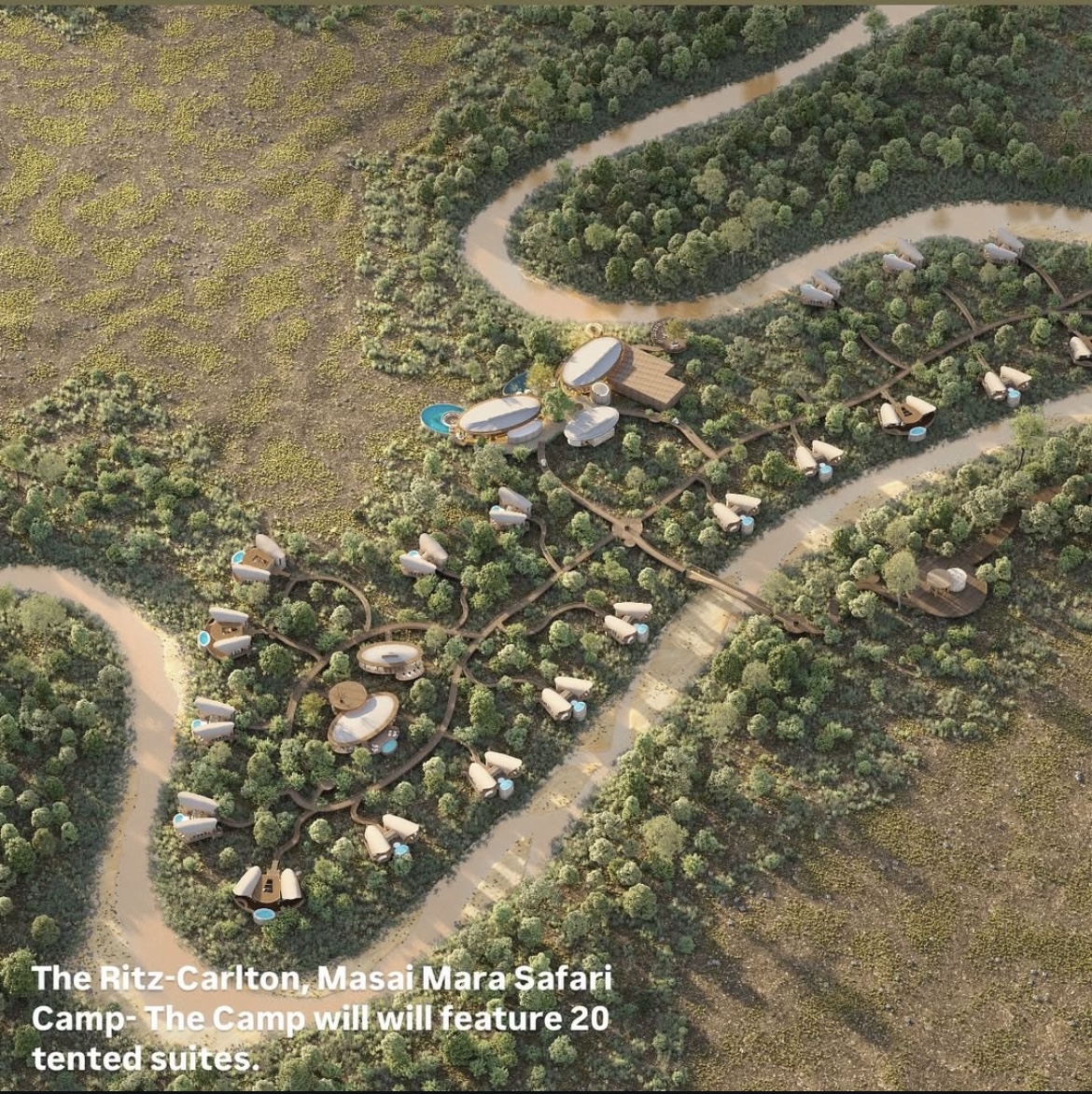Dr. Meitamei Ole Dapash, PhD, PHF
Member, American Philosophical Society (APS)
Paul Harris Fellow | Synergos Senior Fellow
Founder & Director, Maasai Education, Research, and Conservation (MERC) Institute
P.O. Box 253-20500, Narok, Kenya
Tel: +254 711 550055 / +254 711 861939
Email: [email protected]
July 24, 2025
Mr. Anthony Capuano
President and Chief Executive Officer
Marriott International, Inc.
Corporate Headquarters
7750 Wisconsin Avenue
Bethesda, MD 20814, USA
Tel: +1 301-380-3000
Subject: Urgent Demand for Disclosure on Illegal Construction at Sanctuary Site – Sand River, Maasai Mara
Dear Mr. Capuano,
I am writing in my capacity as Director of the Maasai Education, Research, and Conservation (MERC) Institute and as a lifelong advocate for the preservation of the Maasai Mara ecosystem and the cultural and ecological rights of the Maasai people.
It has come to our attention – with grave concern – that the Ritz-Carlton brand, under the auspices of Marriott International, has undertaken the construction of a massive luxury hotel at the Sand River wildebeest crossing, along the Kenya-Tanzania border between the Maasai Mara National Reserve and the Serengeti National Park.
This site is globally recognized as one of the most vital wildlife migration corridors on Earth, and its ecological and cultural importance is irreplaceable. I have personally studied and known this sacred territory for decades. Until your project began, this location was a habitat for endangered black rhinos and large herds of buffalo. Its desecration is a tragedy and a scandal.
Your development has raised urgent legal, environmental, and ethical concerns. Accordingly, we formally demand immediate and full disclosure of the following:
1. Land Lease and Use Agreements
Provide all documentation related to land acquisition or lease agreements, including titles, signatures, dates, and all necessary county and national government approvals.
2. Environmental Regulatory Compliance
Submit certified copies of all communications and permits issued by the National Environment Management Authority (NEMA), including proof of compliance with the Environmental Management and Coordination Act (EMCA, 1999, and its subsequent amendments).
3. Environmental and Social Impact Assessment (ESIA)
Provide the full ESIA report, including records of public participation, expert reviews, mitigation plans, and final authorization from competent authorities.
4. Free, Prior, and Informed Consent (FPIC)
Produce verifiable evidence that meaningful consultations were conducted with local Maasai communities, in accordance with national law and international protocols such as the UN Declaration on the Rights of Indigenous Peoples (UNDRIP).
5. Internal Due Diligence and Sustainability Compliance
Submit internal records confirming adherence to Marriott International’s environmental and ethical policies, including your Serve 360 platform and other sustainability benchmarks.
6. Community Grievance and Redress Mechanisms
Provide information on established procedures for addressing public concerns, environmental degradation, and the cultural harm caused by this project.
As a corporation operating in regulated cities such as New York, London, Tokyo, and Washington, DC – where robust environmental and ethical standards are enforced – it is disturbing that Marriott has evidently adopted lower standards for its operations in Kenya.
Exploiting weak enforcement mechanisms, local corruption, or inadequate oversight is not only unethical; it is a violation of both international best practices and your own stated corporate values. Kenya is not a dumping ground for corporate irresponsibility. The ecological and cultural frameworks that govern this region are not optional – they are legally binding.
Your project has proceeded without transparency, community consent, or public accountability. As a result, we are pursuing legal, diplomatic, and international advocacy measures to halt this development.
These efforts include:
• Legal proceedings now underway in Kenya’s Environment and Land Court.
• Formal complaints to UN agencies, international tourism regulators, and the global conservation community.
• International media exposure of these violations and calls for a boycott of all Marriott brands in the region.
We have already warned the Narok County Government and park authorities against using fire to bait wildebeest prematurely into the Maasai Mara while allowing Ritz-Carlton/Marriott International to obstruct the natural migration route.
Despite public outcry, these authorities have ignored calls for restraint. They are now respondents in an active and embarrassing environmental lawsuit.
It is also deeply regrettable that Ritz-Carlton’s construction has altered the natural landscape – digging trenches and building artificial mounds – to divert or block migrating herds.
These reckless modifications threaten both biodiversity and cultural heritage and have already resulted in repeated wildlife disruption, injuries, and deaths as animals attempt to scale irregular mounds.

The ecological manipulation and environmental degradation by white investors on African ancestral land.
This issue is of profound public interest – not only to the Maasai people, Kenyan citizens, and sustainable tourism stakeholders but also to global conservationists, environmental scientists, indigenous rights advocates, and ethical tourism stakeholders.
We further note with concern yesterday’s revelations by former Attorney General of the Republic of Kenya, Hon. Justin Muturi, that senior county and national government officials have deeply vested economic interests in the Maasai Mara Game Reserve, including the Ritz-Carlton Sand River Safari Camp.
We demand confirmation whether Marriott International knowingly entered such compromised arrangements. If so, this would constitute complicity in the expropriation of indigenous land and the destruction of a World Heritage ecosystem, recently included in the World’s Record Book in London as a significant ecological site for humanity.
We are aware that The Ritz-Carlton plans to open its doors on August 5, 2025, to affluent tourists paying between $3,000 and $26,460 per night at the expense of this global heritage.
We must inform these well-meaning travelers that their unintended contribution to the destruction of Maasailand is the result of Ritz-Carlton/Marriott International and local political leaders’ greed-driven agenda and lack of care for the environment.
We therefore demand your full written response and all supporting documentation within fourteen (14) calendar days of the date of this letter. Failure to respond in a timely and complete manner will trigger the escalation of our advocacy, legal, and international reporting measures.
Respectfully,
Dr. Meitamei Ole Dapash, PhD, PHF
Founder & Director
Maasai Education, Research, and Conservation (MERC) Institute
Member, American Philosophical Society
Paul Harris Fellow | Synergos Senior Fellow
Download a copy of this letter from my Telegram channel on the link below;
https://t.me/francisgaitho/1392
CC:
• Hon. Dr. Deborah Mlongo Barasa, Cabinet Secretary, Ministry of Environment, Climate Change and Forestry, Ministry of Environment Complex, Popo Road, South C, Nairobi, Kenya, Email: [email protected]
• H.E. Patrick Ntutu, Governor, Narok County, Office of the Governor, Narok County Government Headquarters, P.O. Box 898–20500, Narok, Kenya, Email: [email protected]
• Mamo B. Mamo, Director General, National Environment Management Authority (NEMA), Popo Road, Off Mombasa Road, Nairobi, Kenya, Email: [email protected] | [email protected]
• Inger Andersen, Executive Director, United Nations Environment Programme (UNEP), United Nations Avenue, Gigiri, Nairobi, Kenya, Email: [email protected]
• Kenya Media: NTV, Citizen TV, KTN, K24, APS
• US Media: Reuters, Washington Post, NY Times, NPR, LA Times
• UK Media: BBC, The Guardian, London Times
• Kenya Wildlife Service (KWS)
• Wildlife Conservation Society (WCS)
• Lewa Wildlife Conservancy
• World Wildlife Fund for Nature (WWF)
• Conservation International (CI)
• Big Life Foundation
• Ol Pejeta Conservancy
• Sheldrick Wildlife Trust (SWT)
• Kenya Wildlife Trust (KWT)
• Conservation Alliance of Kenya (CAK)
• Kenya Wildlife Conservancies Association (KWCA)
• East African Wildlife Society (EAWLS)
• African Wildlife Foundation (AWF)
• International Fund for Animal Welfare (IFAW)


1 comment
[…] ya Elimu, Utafiti na Uhifadhi ya Wamasai (MERC), ilimwandikia barua Mkurugenzi Mtendaji wa Marriott International, Anthony Capuano, ikiomba kupatiwa nyaraka zote […]